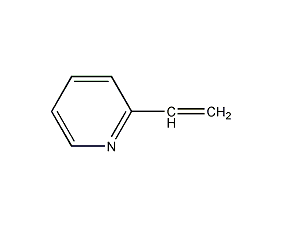
Structural formula
| Business number | 02JH |
|---|---|
| Molecular formula | C7H7N |
| Molecular weight | 105.14 |
| label |
2-Butylopyr, 2-vinylpyridine, 2-vinylpyridine, 2-Vinylazobenzene, 2-vinylazobenzene, 2- Vinylazobenzene, 2-vinylpyridine monomer, 2-Pyridylethylene, 2-Ethenyl-Pyridin, 2-Pyridylethylene, 2-Vinyl-Pyridin, Alpha-Vinylpyridine, Pyridine, 2-Vinyl-, 2-Ethenylpyridine, 2-Vinylpyridine, 2vp, Heterocyclic compounds |
Numbering system
CAS number:100-69-6
MDL number:MFCD00006355
EINECS number:202-879-8
RTECS number:UU1040000
BRN number:104505
PubChem ID:None
Physical property data
1. Properties: colorless liquid
2. Density (g/mL, 20℃): 0.9985
3. Relative vapor density (g/mL, air=1 ): Undetermined
4. Melting point (ºC): Undetermined
5. Boiling point (ºC, normal pressure): 159-160
6. Boiling point (ºC, 3.76KPa): 79-82
7. Refractive index: 1.5495
8. Flash point (ºC): 46
9. Specific rotation Degree (º): Undetermined
10. Autoignition point or ignition temperature (ºC): 440
11. Vapor pressure (mmHg, ºC): Undetermined
12. Saturated vapor pressure (kPa, 45ºC): 1.33
13. Heat of combustion (KJ/mol): Undetermined
14. Critical temperature (ºC): Undetermined Determined
15. Critical pressure (KPa): Undetermined
16. Log value of oil-water (octanol/water) partition coefficient: Undetermined
17 . Explosion upper limit (%, V/V): 10.7
18. Explosion lower limit (%, V/V): 1.3
19. Solubility: slightly soluble in water, extremely Easily soluble in acetaldehyde, ether and chloroform, soluble in benzene and acetone.
Toxicological data
1. Acute toxicity: Rat oral LD50: 100mg/kg; Rat inhalation LC50: 610mg/m3; Mouse oral LD50: 420mg/kg; Mouse inhalation LC50: 460mg/m3; Guinea pig skin contact LDLo: 500 mg/kg; Mammalian oral LD50: 415mg/kg; 2. Other multiple dose toxicity: rats Inhalation TCLo: 5mg/m3/4H/48W-I;
Ecological data
This substance is slightly hazardous to water.
Molecular structure data
1. Molar refractive index: 35.26
2. Molar volume (cm3/mol): 108.6
3. Isotonic specific volume (90.2K ): 266.3
4. Surface tension (dyne/cm): 36.1
5. Dielectric constant:
6. Dipole moment (10-24cm3):
7. Polarizability: 13.98
Compute chemical data
1. Reference value for hydrophobic parameter calculation (XlogP): None
2. Number of hydrogen bond donors: 0
3. Number of hydrogen bond acceptors: 1
4. Number of rotatable chemical bonds: 1
5. Number of tautomers: none
6. Topological molecule polar surface area 12.9
7. Number of heavy atoms: 8
8. Surface charge: 0
9. Complexity: 78.5
10. Number of isotope atoms: 0
11. Determine the number of atomic stereocenters: 0
12. Uncertain number of atomic stereocenters: 0
13. Determine the number of chemical bond stereocenters: 0
14. Number of uncertain chemical bond stereocenters: 0
15. Number of covalent bond units: 1
Properties and stability
1. Constant fire and explosion hazard: It is flammable and its vapor can form an explosive mixture when mixed with air. Can burn when exposed to open fire. It decomposes when heated and releases toxic gases. During use and storage, self-polymerization reactions are prone to occur, causing accidents. Avoid contact with oxidizing agents, acids, UV radiation, heat, free radical initiators.
2.Vinyl pyridine has strong tear-inducing, irritating and toxic properties. The production workshop should have good ventilation and the equipment should be sealed. Operators should wear protective equipment (such as gas masks, gloves, overalls, etc.).
Storage method
1. Store in a cool, ventilated warehouse. Keep away from fire, heat, water and anti-static. should be kept away from oxidizer, do not store together. Keep sealed. Store in dark place. Use explosion-proof lighting and ventilation facilities. It is prohibited to use mechanical equipment and tools that are prone to sparks. The storage area should be equipped with emergency release equipment and suitable containment materials. 2. Store tightly in glass bottles and externally packaged in iron barrels or wooden barrels. Store in a cool, dry and ventilated place. Sun protection and moisture-proof. Storage and transportation according to regulations on toxic chemicals
Synthesis method
1. Obtained from dehydration of 2-hydroxyethylpyridine.

2. From 2-methyl For the reaction of pyridine and formaldehyde, the ingredient ratio is 2-methylpyridine: formaldehyde: sodium hydrochloride solution (50%) = 1:0.4:0.1. Mix 2-methylpyridine and formaldehyde evenly, pump them into the pipeline reactor through a plunger pump, control the flow rate so that the residence time of the reaction solution is 8 minutes, maintain the pressure at 9.08MPa, and the temperature at 250°C ± 2°C. Carry out an addition reaction to obtain 3 -Hydroxyethylpyridine solution, yield 30%. Recover unreacted 2-methylpyridine from the obtained 2-hydroxyethylpyridine solution, add 50% sodium hydroxide solution for washing, and apply after rectification. Add 50% sodium hydroxide solution to the remaining liquid, heat to reflux for dehydration, and then distill under reduced pressure. Collect the fractions above 70°C (8.0kpa) to obtain crude 2-vinylpyridine; stop collecting when the temperature reaches 160°C, and then refine. Distillate and collect the fractions above 70℃ (2.67kpa) to obtain 2-vinylpyridine fine product with a yield of 30% and a gas chromatography content of more than 98%.
Purpose
This product can be copolymerized with butadiene and styrene to produce vinyl pyridine modified latex, which can also be used as adhesive. Polyvinylpyridine is oxidized to obtain Kesiping, a drug for preventing and treating silicosis; this product is also an intermediate of the vasodilator drug Betadine hydrochloride. It is also used in the antihalation layer of photographic films and polymer electrolytes.

 微信扫一扫打赏
微信扫一扫打赏

